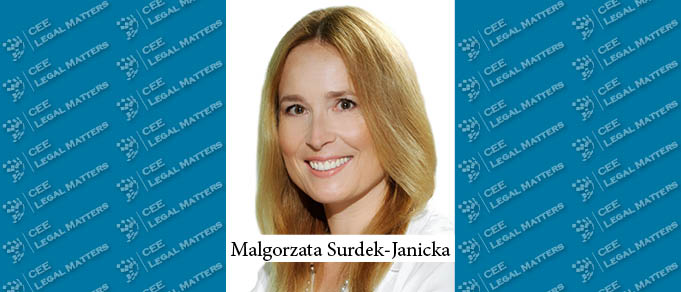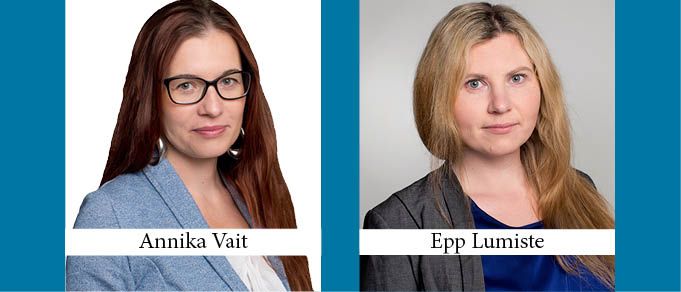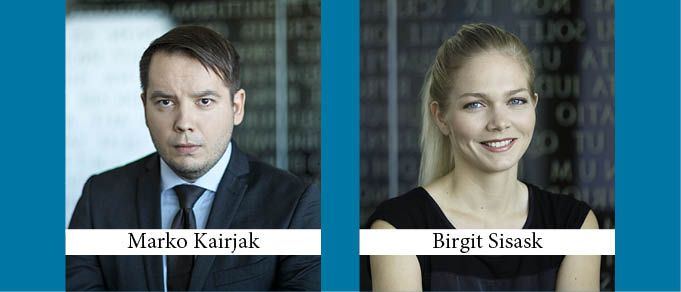Former SupplierPlus Head of Group Legal Kirill Lezeiko returns to private practice by rejoining PwC Legal in Estonia.
ICC International Court of Arbitration Appoints Malgorzata Surdek-Janicka as Vice-President
CMS' Malgorzata Surdek-Janicka has been appointed as Vice-President of the International Court of Arbitration at the International Chamber of Commerce in Paris. Aside from Surdek-Janicka, 33 lawyers from CEE were appointed as members and alternate members of the court.
Deal 5: Practica Capital Co-Founding Partner Donatas Keras on Investment in Biomatter Designs
On January 18, 2021, CEE Legal Matters reported that Cobalt had advised Practica Capital on its investment in Lithuanian start-up Biomatter Designs – part of the latter's EUR 500,000 investment round. CEEIHM spoke with Donatas Keras, Co-Founding Partner at Practica Capital to learn more about the matter.
Estonia: Active Real Estate Market Gets Further Support from Online Transactions
Estonia’s real estate market is going strong despite the uncertainties and hardships caused by the COVID-19 pandemic. The number of real estate transactions was 20% higher and the total value of transactions 31% higher in the fourth quarter of 2020 than the same quarter the year before (and up 11% and 31% from the third quarter of 2020). As prices also continue to rise – the composite real estate index rose 10% year-on-year – Estonia remains an attractive place for real estate investments. Recent changes, further digitizing the transactions, are making it easier than ever for foreign investors.
Estonia: Change to Success
Despite the shocking and unanticipated effects of the first pandemic wave in spring 2020, the focus has shifted, now that the second wave is rolling in, from supporting affected individuals with state salary supplements and banking-sector-provided grace periods to the necessity for a more holistic view in order to help affected industries survive.
No Blues in the Baltics: Irmantas Norkus Leads Cobalt to Success
In 2015, the word Cobalt took on a new meaning in the legal markets of Belarus, Estonia, Latvia, and Lithuania, when a new pan-Baltic law firm with that name opened its doors, immediately entrenched in the top tier of the region’s legal markets. That firm owes much of its success and reputation to the Managing Partner of its Lithuanian office and Chairman of the firm-wide Management Board, Irmantas Norkus.
Expat on the Market: Theis Klauberg of Klauberg Baltics
Theis Klauberg took a circuitous route to managing his eponymous firm in the Baltics. He began his education in Germany, at the University of Hamburg, Heidelberg University, and Humboldt University of Berlin, before obtaining an LL.M. at the University of the Western Cape in South Africa, then concluding his formal education with an MBA at the Baltic Management Institute. His professional career has been no less diverse, as he has worked in Germany, Latvia, Lithuania, Estonia, Belarus, and Zimbabwe.
Capital Markets in Estonia
Contributed by Ellex Raidla.
CEELM Covid-19 Comparative Legal Guide: Contracts in Estonia
Contributed by Cobalt
Case Law Developments Support the Commercial Real Estate Market
Estonia’s commercial real estate sector is enjoying steady growth in practically all segments, with the construction of numerous new office buildings, logistics centers, hotels, and industrial buildings. Even though the majority of transactions are still being made by local property funds, there is an increasing inflow of foreign capital looking for decent returns in a stable environment. One critical aspect facilitating foreign investments into Estonia’s property market is the favorable legal environment.
New Estonian Covered Bond Regime
Earlier this year the Estonian parliament enacted long-awaited dedicated covered bond legislation, finally allowing local banks to enter both regional and European-wide covered bond markets and to gain access to a reasonably priced and stable source of long-term funding for their key banking businesses (most importantly for funding the issuance of mortgage loans). Additionally, under the new legislation, local covered bond issuers able to meet prudential requirements under the Capital Requirements Regulation (CRR) will be able to benefit from certain forms of preferential treatment afforded to covered bonds. For the local banking sector that, at the moment, remains dominated by Scandinavian banking groups, the new legislation also creates a viable alternative to the parent funding.
Patient Insurance Reform Has Been Initiated in Estonia
With the June 7, 2019 initiation of the draft Patient Insurance Act, the Estonian Ministry of Social Affairs has achieved an important milestone in the development of the Estonian health care system. This draft act marks a principal change towards the creation of a patient-centric health care system, which will have a major effect on patients, health care service providers, health care professionals, insurance companies, and society at large.
Why Should One Invest in Estonian Agriculture?
Estonia is probably best known for its IT businesses and startups. At the same time its population density is among the lowest in Europe, which means that forestry and agriculture are also topics to look into. Due to the country’s geographical location and climate, Estonia is well-suited for dairy farming, and the Estonian islands and seaside regions are also very good for beef cattle farming. Agricultural subsidies provided by the European Union and the Estonian government have resulted in some of the most modern dairy production facilities in the world, making the Estonian average cattle herd size the second-highest in Europe. As a result of state-of-the-art genetics, the average milk production per cow is over 9,300 kilos per annum – the second highest result in Europe, right after Denmark. As a consequence, foreign investors have turned to Estonia for investment possibilities. Here we would like to look more into the possibilities of investing in Estonian agriculture and what to bear in mind.
Guest Editorial: CEE Legal Counsel Going Forward - Experts or Advisors?
Upon reflection, 2018 feels like a year of reversal – the long economic expansion, fueled by quantitative easing by central banks, is losing steam, love for FAANGs and Big Tech turned into techlash, trade wars emerged and escalated, a negotiated divorce between the UK and the EU is descending into a disorderly no-deal Brexit, and so on. There is much to ponder in the short-term. Long-term challenges for the legal profession, however, lie elsewhere.
Now or Never: The Looming GDPR Deadline
The European Union’s General Data Protection Regulation is, according to the EU-hosted GDPR website, “the most important change in data privacy regulation in the past 20 years.” The Act, which was approved by the EU Parliament on April 14, 2016 and will become fully effective on May 25, 2018, was designed “to harmonize data privacy laws across Europe, to protect and empower all EU citizens’ data privacy, and to reshape the way organizations across the region approach data privacy.”
A Night of Celebration at CEE Deal of the Year Awards Banquet in Prague
The winners of the 2017 CEE Deal of the Year Awards were announced at the first ever CEE Legal Matters Deal of the Year Awards Banquet last night in Prague. The biggest smiles in the joyous and music-filled celebration of CEE lawyering, perhaps, were on the faces of Partners from Avellum and Sayenko Kharenko, which, along with White & Case and Latham & Watkins, won the award both for Ukrainian Deal of the Year and CEE Deal of the Year for their work on the 2017 Ukraine Eurobond Issue (a story initially reported by CEE Legal Matters on October 2, 2017).
Simplified Entrepreneurial Income Taxation Act Creates a New and Innovative Taxation Option in Estonia
On January 1, 2018, a new taxation act will enter into force in Estonia – the Entrepreneurial Income Simplified Taxation Act (hereinafter the “Act”). From an IT point of view, the Act will create a new and innovative automatic mechanism for natural persons in the calculation and payment of taxes. The main concept of the Act is that natural persons can set up an entrepreneurial income bank account, where the taxation amount is calculated automatically and transferred to the Tax Authority without the natural person having to physically make or authorize any transfers. However, use of this new account may be limited in practice.
FCPA and UK Anti-Money Laundering Act Compliance in Estonia
According to TRACE Matrix 2016 results, Estonia is the third least corruption prone country in the world, minimizing the risk of liability under anti-corruption regulations. To date, there is no case law under FCPA rules concerning Estonia. Nevertheless, the legal framework set by the FCPA gives rise to theoretical problems of definition which may hinder its enforcement.














































